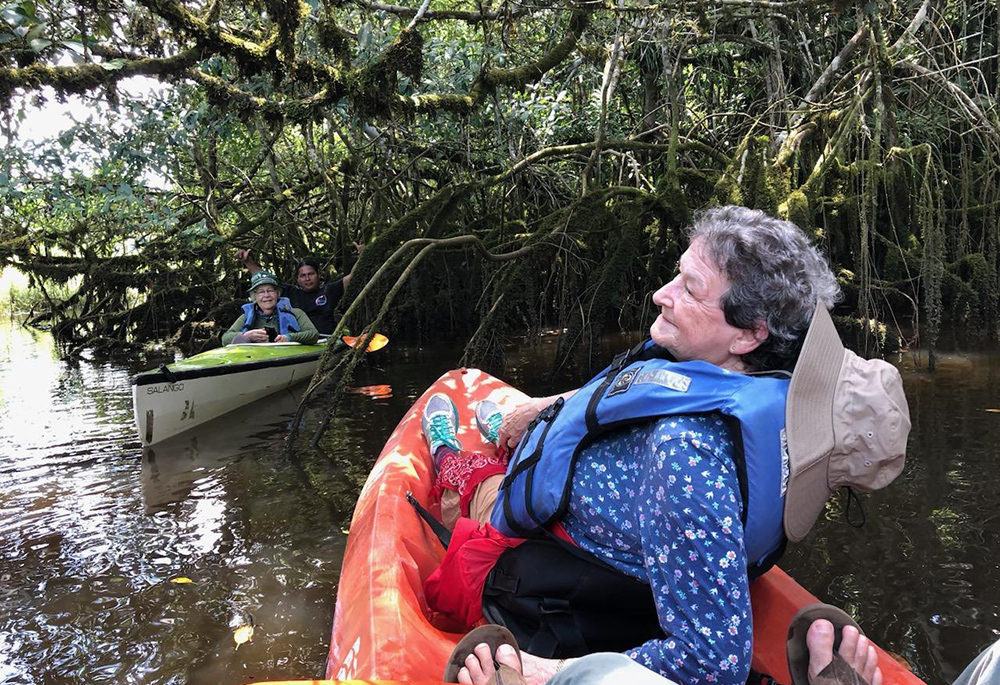
Adrian Dominicans Sr. Lorene Heck (foreground) and Sr. Mary Priniski with Achuar guide Celestino Antik, travel on the Pastaza River during an ecotourism trip through Maketai, a nonprofit co-founded by Adrian Dominican Sr. Judy Bisignano. The ecotrips give Western visitors a close-up introduction to both the Achuar and the Amazon. (Courtesy of Lorene Heck)
When Adrian Dominican Sr. Lorene Heck served as a regional superior for her congregation, she got to know fellow Adrian Dominican Sr. Judy Bisignano and her passion — the Amazon rainforest in Ecuador and the Achuar, the Indigenous people who have lived near its river basins for centuries.
Heck remembered visiting Bisignano after her health left her bedridden.
"The walls of her room were covered with mounted photos of her friends and family in the Achuar communities in Sharamentsa, Wayusentsa, Kapawi," Heck said. "It was her family. She more than felt the people inside of her, she felt that she belonged to those communities."
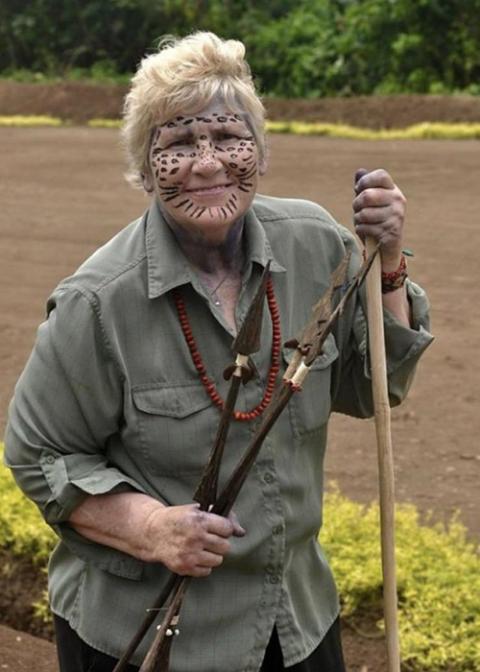
Sr. Judy Bisignano received the name "Sister Jaguar" from the Achuar after she had a rare sighting of a black jaguar while in the rainforest. Bisignano died in 2023. (Courtesy of Sandra Morse)
Heck and Adrian Dominican Sr. Mary Priniski traveled into the Amazon in 2022 and 2023 through Maketai, an Arizona-based nonprofit co-founded by Bisignano and Sandra Morse, a communications consultant, in 2015. Maketai is the Achuar word for "thank you."
The organization's focus, according to its website, is to "support the social justice platform and ecological goals of the Achuar people." It partners with an Ecuadorian nonprofit, Fundacion Mente, on projects ranging from reforestation of the rainforest to ecotourism.
The ecotrips are designed to give Western visitors a close-up introduction to both the Achuar and the Amazon, which stretches across eight South American countries. Visitors like Heck and Priniski canoe the Kapahuari River, hike the rainforest and share meals in the thatched-roofed, open-air homes of Achuar families. While many Achuar speak their native language, younger generations are learning Spanish, Heck said. Ecuadorian mestizos (people of mixed European and Indigenous American ancestry) and Achuar guides who speak Spanish and some English serve as translators.
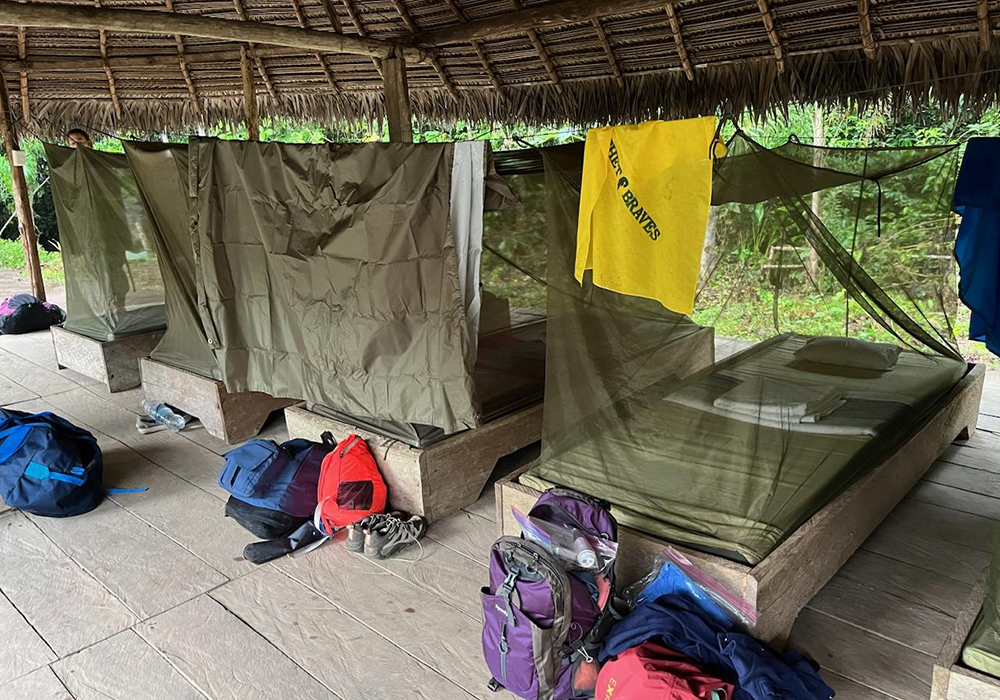
Maketai uses an ecotourism program to give visitors an up-close introduction to the Amazon rainforest and the Achuar people there. Visitors sleep in quarters like these at a lodge in Wausentsa. (Courtesy of Lorene Heck)
From a window of the small plane that flew into the airport at Shell, Ecuador — named for the oil company whose employees once populated then abandoned the town in the 1940s after searching for oil — Heck saw how development has shrunk the rainforest. She said she was impressed not only by the Achuar's commitment to prevent further deforestation in the Amazon, but their overall determination, like the tour guide whose walk from his home to the community where tourists gathered took almost four days.
At the ecolodge in Kapawi, Heck saw a cookie jar filled with animal crackers, which she said was a nod to Bisignano, who brought bags of the cookies on her trips to the Amazon. A year after her death last June at 81, Bisignano's presence is still felt in the Achuar communities, Heck said.
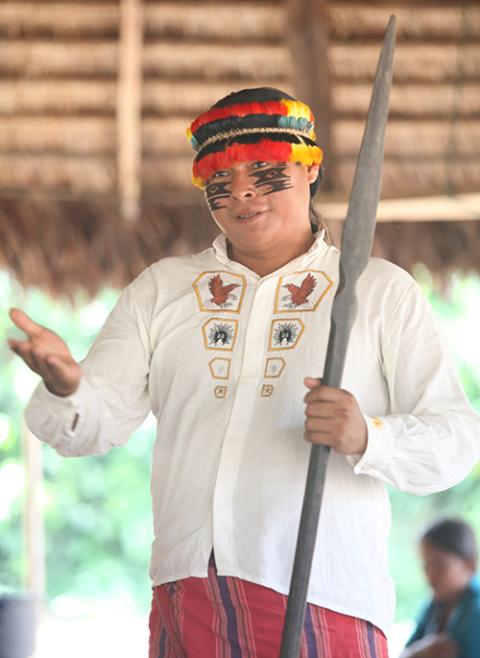
Celestino Antik, an Achuar from the community of Kusutkao in Ecuador, gives guided ecotours of the Amazon rainforest. Antik is a local coordinator for Fundacion Mente, a nonprofit collaborating with Maketai in its ecotourism program. (Courtesy of Sandra Morse)
"When you go there, the people talk about Sister Judy," she said "They regard her as a beloved elder. When we were there in November, the loss for those who really knew her was palpable."
"We have deep gratitude towards her. She came to teach us to respect biodiversity," said Celestino Antik, an Achuar guide from Kusutkao and a local coordinator at Fundacion Mente, in a translated email. "Sister Judy was ahead of us at the end of life, as we all walk the same path and will also depart leaving a story. It is a great example for all of us, if only we could leave a story like the one Sister Judy has left for us."
Bisignano earned the name "Sister Jaguar" among the Achuar after she witnessed the rare sighting of a black jaguar prowling a river's edge in the rainforest. Her relationship to the Achuar — and her own accomplished but sometimes troubled life — is detailed in a short film, "Sister Jaguar's Journey," and a memoir of the same name, which she co-wrote with Morse.
Morse was a consultant in the private and public charter schools Bisignano directed in Tucson, Arizona. The two, who became close friends, regularly talked about Bisignano's lifelong struggle with anger issues. Morse had made repeated trips into the Amazon through a nonprofit group called the Pachamama Alliance, and she felt Bisignano could find emotional healing among the Achuar. Morse said the ensuing trip did even more for her friend by sparking an abiding interest in the rainforest and its native people.
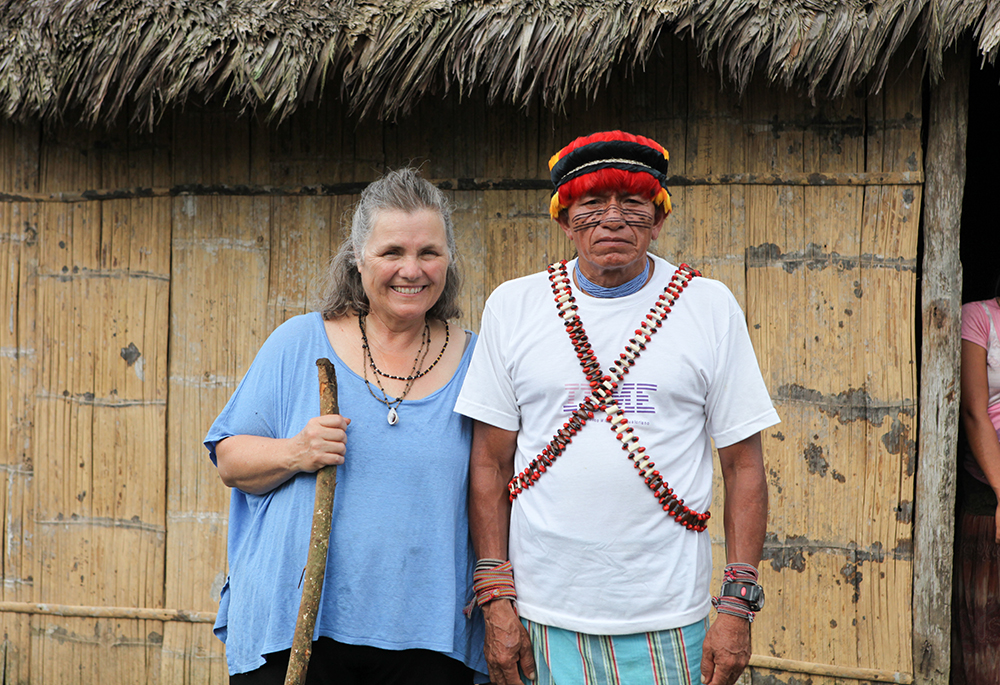
Sandra Morse, who co-founded Maketai with Sr. Judy Bisignano, stands beside an Achuar shaman. Morse said a trip to the Amazon she arranged for Bisignano sparked a deep interest in her friend for the region and its people. (Courtesy of Sandra Morse)
"When we went down to the Achuar territory, she wanted to know, 'Where are the women? What are they doing all day long?' " Morse said. "She found them in the chakras, or gardens. Sister Judy sat with some women and said, 'What's your life like? What do you need?' And the women told her they needed Spanish-English dictionaries for their children to learn languages. So she had 8,000 Spanish-English dictionaries flown into the territories for the women and children."
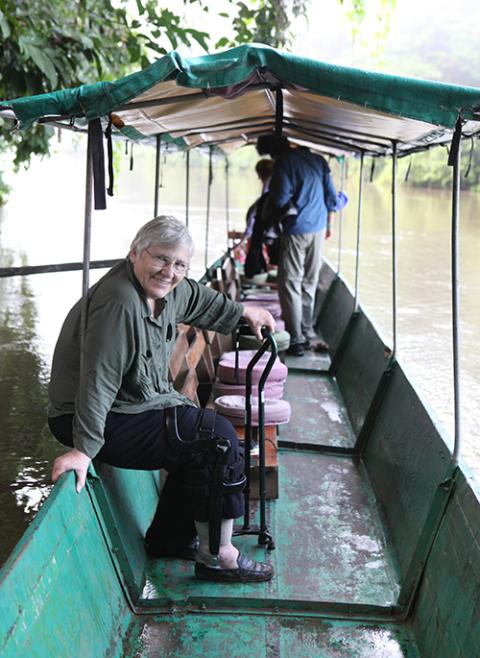
Sr. Judy Bisignano sits on a boat along an Amazon river. (Courtesy of Sandra Morse)
Bisignano kept returning to the rainforest and talking to the Achuar, learning about their concerns and challenges in the 21st century. When they created Maketai, she and Morse realized collaborating with an organization like Fundacion Mente that was in regular contact with Achuar would give projects a needed local perspective.
At Fundacion Mente, where Achuar sit on the board and make up a majority of the staff, Ecuadorian director Julián Larrea said since its founding in 2009, the organization has evolved to include more Achuar input.
"[Initially] even though all projects were discussed, agreed and strategized from both parties, Achuar and mestizo, the majority of ideas came from mestizo," Larrea said in an email. "It was not until the pandemic in 2020 when Fundacion Mente became acquainted with the Achuar request of fully participating in the creation of any project to be implemented in their territory. They said, "Projects should be born in the community.' "
"It is important that we who work with our people are Achuar," Antik said, adding that the experience has been eye-opening.
Advertisement
"We are learning how to create, finance, manage and monitor projects and know what the process is like," he said. "I never knew how to find funds or how they are handled. Now I understand that it is not that easy. You have to propose a project, present a profile, locate the funds, create a map of activities, be clear about the objectives, implement and monitor. This is how we Achuars learn."
Priniski, who is on Maketai's board, said projects can include Western technology and input. "We don't want to tell people what to do, but to live in a way that we have a positive influence and they have a positive influence on us," she said. "We can't separate ourselves. We live in one world, and the question is what can we do to support them and their goals, which is to maintain the rainforest and the river."
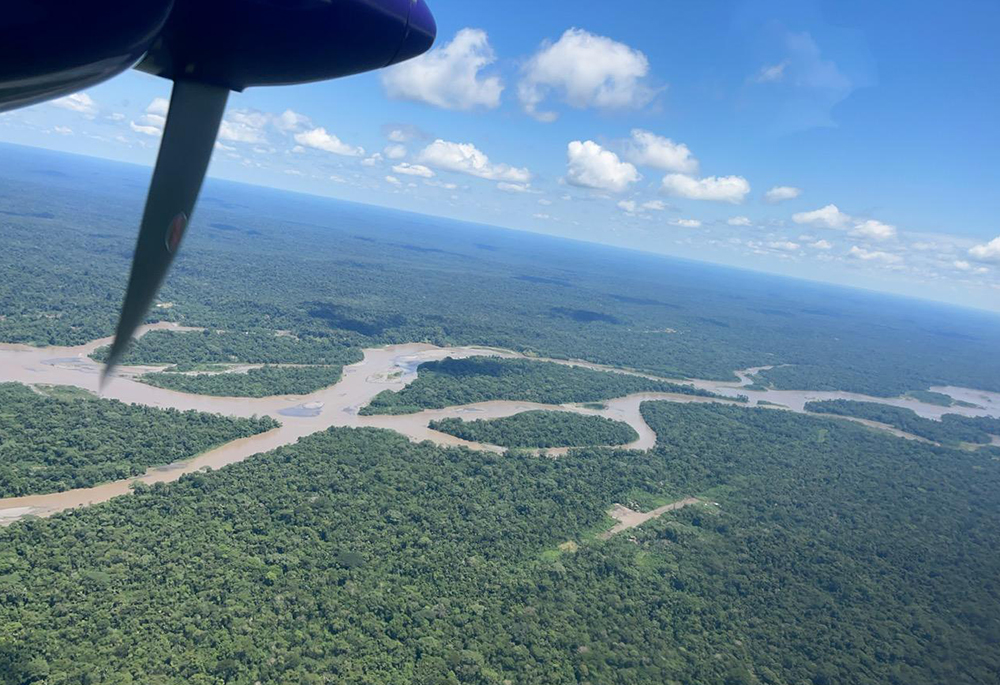
Dense jungle and rivers are visible from the window a small plane flying tourists into the Amazon. (Courtesy of Lorene Heck)
"We recognize how our ancestors created communities, created our history, created the infrastructure which we now take advantage of and depend on, such as airstrips, schools, tourist ventures and public services," Jose Peas, a regional coordinator and board member of Fundacion Mente, said in a translated email. "We realize that the new generation has other needs, but like every generation, the current one tends to lose its way: the money, the ease that the market provides, the illusion of technology. Here we refresh and value what we are, take a pause and ask ourselves 'where do we come from' and 'where we are going.' In other words, wake up to the opportunity we have so we do not miss it."
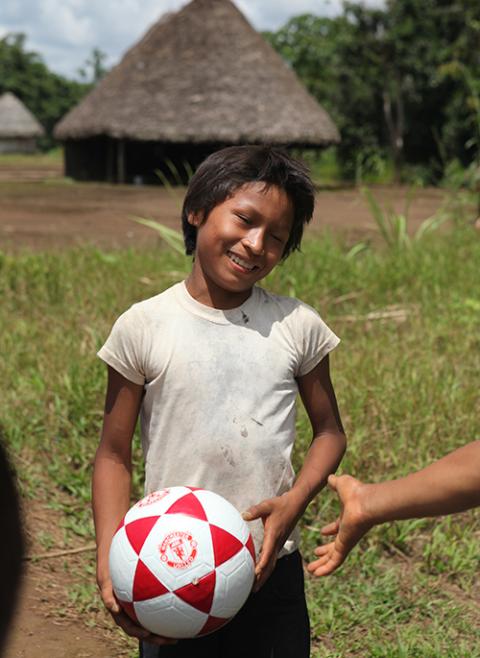
One of Maketai's projects suggested by the Achuar was a soccer tournament to bring together residents from area communities. (Courtesy of Sandra Morse)
Maketai's projects frequently connect distant communities isolated because transportation is mainly by canoe or on foot. Unity gives the communities strength and vision, Morse said. One project developed when the Achuar, concerned with over-hunting jungle wildlife, were looking for an alternative source of protein. Four communities now have chickens, and the women who are raising them will teach women in other communities to care for their own flocks. A similar project is planned for fish farms, she said.
More recent projects have included a soccer tournament that brought 600 Achuar together for the first time, a contingent of Achuar who traveled to New York to speak at the United Nations Permanent Forum on Indigenous Issues, and the installation of an internet system in the Ecuadorian Amazon that will allow communities to share their tribal history.
Although Bisignano didn't much care for legacies, calling them "self-serving" in an interview, she agreed with poet Maya Angelou that each person needs to make an inerasable mark on the world. One potential Achuar project would memorialize Bisignano, who held graduate degrees in biology and ecology, and saw both beauty and fragility in the Amazon's ecosystem.
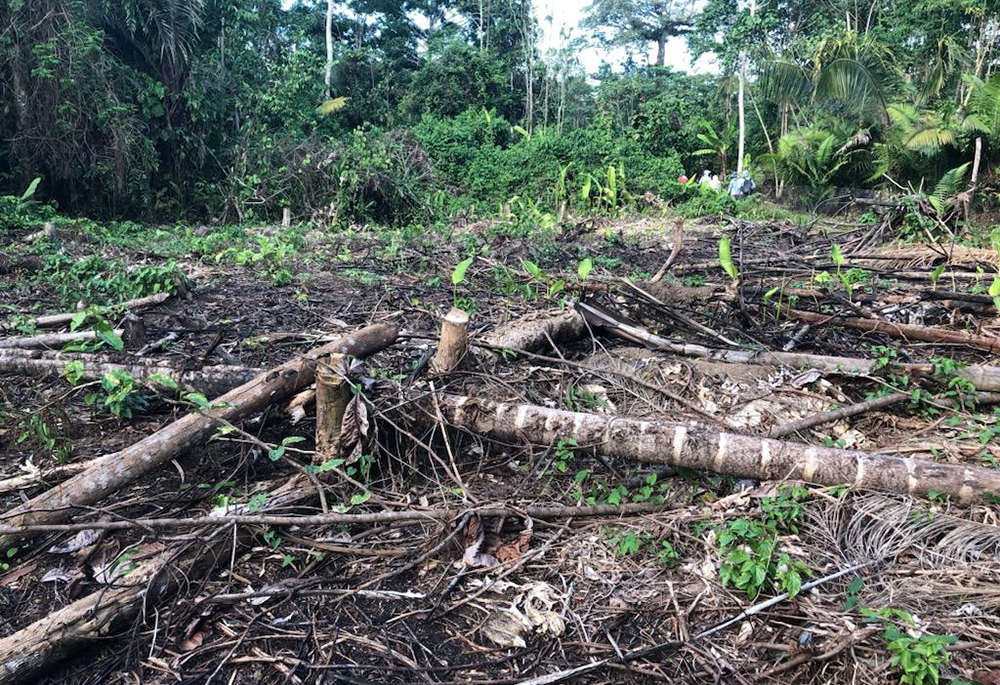
The pale green leaves of new tree growth can be seen in an area of the rainforest that’s been cut for use in area homes. Maketai projects, like the planting of some 10,000 new trees, have been funded through grants from the Adrian Dominicans' ministry trust fund. (Courtesy of Lorene Heck)
"It was always her dream to respect nature and now we are empowered to respect, in exchange for receiving the idea, of changing our habits," Antik said. "Now we think about creating a preserve in our community that bears her name and respects biodiversity in exchange for the undertaking carried out."
Grants from the Adrian Dominicans' Ministry Trust Fund have been made to Maketai for the last five years, including a grant for fiscal year 2024-25, said Heck, the fund's director. She said the nonprofit's focus on preserving the rainforest and maintaining a relationship with the Achuar parallels the Adrian Dominicans' mission of ecojustice, sustainability and solidarity with the poor.
"I wouldn't say we're making Judy's ministry continue as much as we're kind of getting on the bandwagon with what Judy believed in — with the people and with the rainforest," Priniski said. "It's bigger than her. She introduced us, but then we need to keep going. We build on each other's work. We build on each other's ministry."




